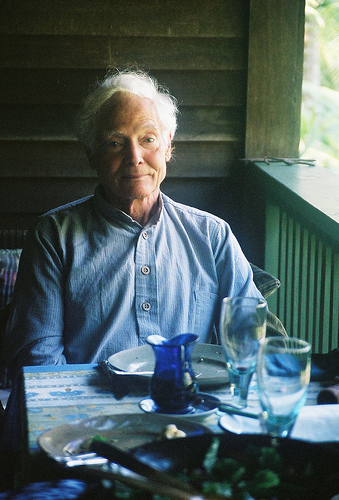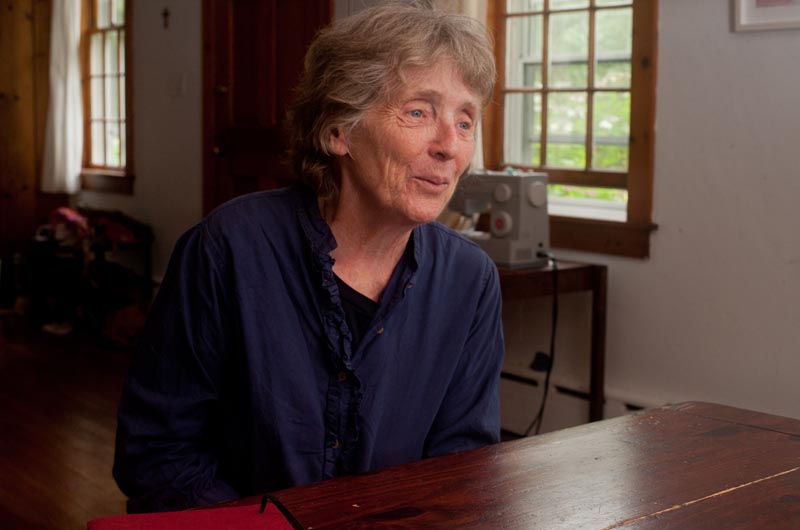from Fanny Howe's Second Childhood:
The Monk and Her Seaside Dreams
The monk is a single
and so am I
but which kind?
All of them
from young to wild
and the boyish one
(mine) cared for the weak
until there was no one
to care for him
besides an old woman
who lived as a she.
I became a penitent
sequentially:
first in sandals
then in boots
then with a hood
and bare feet.
Now night-bound, now nude, then old.
·•·
Another brother and I took a train with a view of mountains
floating in water
out of Limerick Junction
to Heuston Station where Wittgenstein
tried to discover emotion.
He hit a horizon.
"Philosophy should only be written as poetry."
·•·
In a Sabbath atmosphere you stand still and look backwards
for time has ceased its labors
and no cattle tremble.
You can contemplate the peripheries
and for a flash see the future as a field in a semi-circle.
Everything is even on the Sabbath. The died and the living.
Each person or place wants you as much as you want another.
·•·
Towards a just
and invisible image
behind each word
and its place in a sentence
we must have been sailing.
Scarcely defended, best
when lost from wanting perfect sense.
But still, recognizable.
Be like grass, the phantom told us:
lie flat, spring up.
Our veils were scrolls
you couldn't walk into
but only mark the folds.
·•·
I've lost my child at the bend where we parted.
We will never come back to that hour.
Let me write about the place again the path so sandy
and the table cloth blowing in a wind from Newfoundland.
It was here it began. She left her bouillabaisse untouched
and headed out on the train.
Sort of, soft, gold at sunset, turrets and sandals
were hard to identify so many copies.
Let me concentrate on ancestral faces
and I will recognize hers
before my powers fail and our DNA has been smeared
on cups and cigarettes, bottles and gloves, bowls and spoons
and replicated, sucked or kissed into the lips of strangers.
·•·
I have to pass through the estuary
to investigate breakdown as a trail of nerve-endings
at the beginning of everything.
Scrapes like threads seeking holes.
It's a strange textile that serves as a road map.
This one did:
its blue led to the edge.
Where could a fabric begin and end except as a running woman
who sews and passes it along?
So I ran with it in my hands.
A kind of eucharist.
No break in its material from the first day on earth
to the Sabbath where all are equal
and the cows covered in sackcloth.
·•·
Where has my mind gone?
The bloody thieves
are very quick.
You may have noticed I'm naked
and sliced by glass.
Soon words will be disappeared
and then the Celtic church
and seven friends
I will not name.
One word that contains
so many:
dearth, end, earth, ear, dirt, hen, red, dish, it and
I must examine each part
then cut the ropes without a heart and set out.
·•·
The slide downhill on my back to a ledge
and the sea out there and a city
to the left of the mud.
The place they call an area
preparing for an earthquake. Under-shade and crowds
of hungry old people lining for bread.
One woman collapsed on her side
and another helped her up
and I was let into the bunker
by the best kind of communist.
There was orange vomit on a large cape over a large woman.
The hills! No bells.
I went down for what reason.
Not to enter a cell.
Luckily no one was white.
We discovered we were in a loft space from the olden days
that I indicated pleased me.
because I couldn't get my body out no matter what.
I paused long enough to encounter
a slender elder with the delicate posture of a Rastafarian.
The people were indifferent as they are to whites but polite.
The lean man showed me the door in colorful clothing.
But there was a huge blast from the building beside us
And we ran up rickety stairs to look at what
was now a structure speared with broken glass and stone.
A worker was already being transported on a stretcher.
We looked around at the mess then went inside to discuss
our love of failures, every one of us.
·•·
I hauled so many children after me
with ropes and spears and nets
like sea-creatures that others would eat
without them I have no purpose.
As in the Gospel account, I believed in their belief.
But now there would be what? For he, the little one,
was kneeling and saying, You must run.
The lover I still loved stayed near the door
so I raced off, you stood, when the police came
seeking coherence in everything.
The total machine of retribution presses on.
Regardless of a prayer or what a person did.
This is incredible.
We're breaking up.
·•·
A Trappist led me around as one of him
to a ship heading for the country where they edit the best films.
There was a city on deck: residential with pleasing evening trees
and then a downtown area until we couldn't tell the suns
from the portholes on board.
The ship would transport us to a staging dock in Iona.
I would lose my luggage from the twentieth century
(though its particles and buckles were forged in eternity)
and make my private vows to the creator
in every theater we entered.
·•·
Together we traveled in a boat as it filled with night-water
from the bottom up.
By night-water one means fear.
So the refilling is adding a sting to the salt.
Living naked
still leaves you covered
by a surface of wood, feathers, fur or skin.
Bare skin, blue skin: a muff of lambskin
over the ears where the thief can get in.
It's lucky the mind freezes before the heart.
·•·
Back there is the string of mountains your uncle painted
and you lost. Out there is the clotted cream
on a raspberry tart that he couldn't finish.
There is the goose and the blackbird, the brindled donkey
and the trap. They stand on the thin black thread of your lineage.
Your scissors are split, your fiddle is cracked, its strings are thin
and your mouth is dry, your clothes American.
No more rush of notes as if a window is open inside.
Only if you are insane or asleep
and the gods and animals
pound their way in
on a divine night wind.




